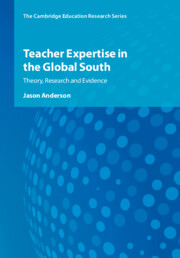Book contents
- Teacher Expertise in the Global South
- Teacher Expertise in the Global South
- Copyright page
- Contents
- Figures
- Tables
- Acknowledgements
- Abbreviations
- 1 Introduction
- 2 The Construct of Teacher Expertise
- 3 The Expert Teacher Prototype
- 4 Effective Teaching in Low-Income Contexts
- 5 Researching Teacher Expertise in the Global South
- 6 A Portrait of Teacher Expertise
- 7 Exploring the Quintain
- 8 Diversity in Expertise
- 9 Teacher Expertise in the Global South
- 10 Updating the Expert Teacher Prototype
- 11 Valuing and Building on Southern Expertise
- 12 Concluding Reflections
- References
- Index
10 - Updating the Expert Teacher Prototype
A Differentiated Framework
Published online by Cambridge University Press: 18 May 2023
- Teacher Expertise in the Global South
- Teacher Expertise in the Global South
- Copyright page
- Contents
- Figures
- Tables
- Acknowledgements
- Abbreviations
- 1 Introduction
- 2 The Construct of Teacher Expertise
- 3 The Expert Teacher Prototype
- 4 Effective Teaching in Low-Income Contexts
- 5 Researching Teacher Expertise in the Global South
- 6 A Portrait of Teacher Expertise
- 7 Exploring the Quintain
- 8 Diversity in Expertise
- 9 Teacher Expertise in the Global South
- 10 Updating the Expert Teacher Prototype
- 11 Valuing and Building on Southern Expertise
- 12 Concluding Reflections
- References
- Index
Summary
This chapter proposes a differentiated framework for understanding teacher expertise that identifies both the most commonly reported (often shared) features of teacher expertise and those features that seem to vary more, particularly in the global South. Commonly identified features are presented as ‘generalisable’ components alongside ‘variable’ and provisional ‘Southern’ components; elements that are likely to be more commonly encountered in the South due to the frequently shared constraints, challenges and affordances resulting from lower financial investment in education and income across Southern communities. It uses the same 12 structuring categories as Chapter 9 (knowledge base, cognitive processes, beliefs, personal attributes, professionalism, interpersonal practices, languaging practices, lesson planning and preparation, balancing between structure and freedom, interaction dynamics, pedagogic strategies and assessment practices), also justifying the components included in each category briefly. It concludes by discussing a number of potential uses of the framework in teacher education, curriculum development and future expertise research.
Keywords
- Type
- Chapter
- Information
- Teacher Expertise in the Global SouthTheory, Research and Evidence, pp. 221 - 234Publisher: Cambridge University PressPrint publication year: 2023

